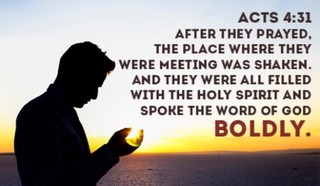
Change Translation
- Recent Translations
- All Translations
Acts 4:15
Share
Listen to Acts 4:15
Settings
Scripture Text Size
15
So they ordered them to withdraw from the Sanhedrin while they conferred among themselves.
Images for Acts 4:15

Acts 4:15 Meaning and Commentary
Acts 4:15
what was proper to be done, the apostles being withdrawn.
FOOTNOTES:
F7 Misn. Sanhedrin, c. 10. sect. 2. & Middot. c. 5. sect. 3.
F8 T. Bab. Roshhashana, fol. 31. 1.
F9 T. Bab. Avoda Zara, fol. 8. 2.
But when they had commanded them
That is, when the sanhedrim had ordered the apostles; or "commanded that both", as the Arabic version reads, both Peter and John; and, it may be, the man that was healed too: to go aside out of the council;
or place where the council, or sanhedrim sat; which, whether it was in the chamber "Gazith", in the temple where they used to sit F7, or in the shops, or in the city, whither they removed, is not certain. We are told F8, that
``the sanhedrim removed from the chamber Gazith, to the shops, and from the shops to Jerusalem, and from Jerusalem to Jabneh;''that is, after the destruction of the city. And the first remove was much about this time; for it is said F9, that
``forty years before the destruction of the temple, the sanhedrim removed, and sat in the shops.''Not in the shops where things were sold for the use of the temple, but in a court adjoining to them, which took its name from them. They conferred among themselves;
what was proper to be done, the apostles being withdrawn.
F7 Misn. Sanhedrin, c. 10. sect. 2. & Middot. c. 5. sect. 3.
F8 T. Bab. Roshhashana, fol. 31. 1.
F9 T. Bab. Avoda Zara, fol. 8. 2.
Taken from John Gill's Exposition of the Bible
Unlock Deeper Insights: Get Over 20 Commentaries with Plus! Subscribe Now
Acts 4:15 In-Context
13
As they looked on Peter and John so fearlessly outspoken--and also discovered that they were illiterate persons, untrained in the schools--they were surprised; and now they recognized them as having been with Jesus.
14
And seeing the man standing with them--the man who had been cured--they had no reply to make.
15
So they ordered them to withdraw from the Sanhedrin while they conferred among themselves.
16
"What are we to do with these men?" they asked one another; for the fact that a remarkable miracle has been performed by them is well known to every one in Jerusalem, and we cannot deny it.
17
But to prevent the matter spreading any further among the people, let us stop them by threats from speaking in the future in this name to any one whatever."
The Weymouth New Testament is in the public domain.